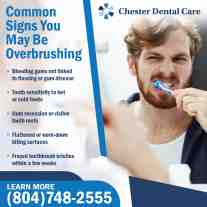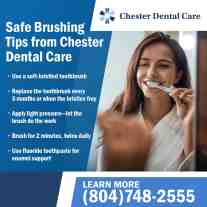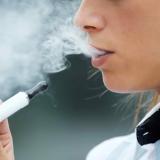Proper oral hygiene is vital for maintaining healthy teeth and gums, but excessive or aggressive brushing can cause significant damage that undermines these efforts. Many patients at Chester Dental Care, who are committed to cleaning their teeth and maintaining dental health, unknowingly brush too hard or too frequently, leading to enamel erosion, gum recession, and increased tooth sensitivity. These problems can develop gradually and often go unnoticed until discomfort or visible changes occur. Understanding the signs of overbrushing is critical to preventing permanent damage that requires complex and costly treatments.
Professional teeth cleaning is vital for detecting early signs of damage from brushing habits. While it cannot reverse enamel loss or gum tissue damage, patients in Chester benefit from personalized care that includes professional cleanings and guidance on safe home brushing techniques. Chester Dental Care helps identify early symptoms like gum inflammation or bleeding, providing tailored advice to protect patients' smiles.
At Chester Dental Care, we often see patients who take their oral hygiene seriously. However, some people brush their teeth too much or too hard. In this blog, we will explain how overbrushing causes harm, what signs to look for, and how to keep your smile safe with good home habits and regular professional teeth cleaning.
Key Takeaways
Overbrushing can cause gum recession, enamel wear, and tooth sensitivity despite regular teeth cleaning.
Professional teeth cleaning removes plaque and tartar safely, supporting overall oral health.
The average cost of teeth cleaning varies, but it is a worthwhile investment to prevent costly dental problems.
Practicing safe at-home habits, such as gentle brushing and flossing, complements professional teeth cleaning services available near you.
If your toothbrush frays quickly or your gums bleed during brushing, your technique may need adjustment.
How Much Brushing Is Too Much?
Brushing more than twice a day or using too much pressure can wear down enamel and irritate your gums.
The American Dental Association (ADA) recommends brushing twice daily with fluoride toothpaste for two minutes each time. While it's tempting to brush after every meal, doing it more than three times a day, especially with force, increases the risk of damaging the enamel and gum tissue. (Source:https://www.ada.org/resources/ada-library/oral-health-topics/toothbrushes) At Chester Dental Care, we also advise using a soft-bristled toothbrush, as harder bristles can scratch enamel over time.

Signs You Might Be Overbrushing
Tooth sensitivity, receding gums, and frayed toothbrush bristles are common signs of overbrushing.
Tooth Sensitivity
If your teeth feel more sensitive than usual or your gums are starting to recede, you might be brushing too hard or too often. Many patients notice discomfort when drinking hot or cold beverages. This sensitivity is often caused by enamel thinning or gum recession that exposes the dentin, the layer beneath the enamel. When dentin is exposed, nerve endings become more reactive to temperature and pressure. Persistent sensitivity should never be ignored, especially if it worsens over time.
Gum Inflammation
Gum inflammation, or gingival irritation, is another red flag. It can occur when the bristles of your toothbrush push too hard against the gum tissue, causing it to become red, puffy, or sore. Patients sometimes assume this is a sign of poor hygiene, leading them to brush even harder, when, in fact, it’s often caused by aggressive brushing habits. Inflamed gums may also feel tender to the touch or bleed slightly when flossing, even if no infection is present.
Bleeding When Brushing
Bleeding during brushing may seem like a sign that you’re cleaning thoroughly, but it’s actually a warning. Healthy gums don’t bleed under gentle pressure. When patients notice blood on their toothbrush or in the sink, it often means the gum tissue is damaged or inflamed. This could be due to brushing too vigorously, especially with a hard-bristled brush. Continuous trauma from overbrushing can strip the gumline, making tissues more prone to infection and leading to receding gums if not addressed.
Notched Areas Near the Gumline
Notches or indentations near the gumline, often referred to as “toothbrush abrasion lesions,” are physical signs of enamel erosion. These typically appear on the cheek-facing surfaces of the teeth, where people tend to press harder. We often see V-shaped grooves on the front teeth, especially in patients who use a horizontal scrubbing motion. These lesions don’t just affect the appearance of your teeth—they can also increase sensitivity and make teeth more vulnerable to decay.
Visible Enamel Wear
Enamel wear is a gradual process, but excessive brushing speeds it up. Once the shiny outer layer of the tooth starts to wear down, it becomes thinner and more translucent. You may notice a yellow tint on your teeth as the underlying dentin begins to show. Unlike cavities, which are localized, enamel erosion tends to be uniform across multiple teeth. Patients with enamel wear often feel increased sensitivity and may find that whitening products or acidic foods cause discomfort.
A Toothbrush That Frays Quickly
If your toothbrush looks worn out within a month of use, that’s a strong indicator of overbrushing. A properly used soft-bristled toothbrush should last around three months. Frayed bristles mean you’re using too much pressure or brushing too frequently. These worn bristles can also become less effective at removing plaque while increasing the risk of soft tissue damage. We always recommend checking your brush monthly and adjusting your technique if it’s wearing out too fast.
We often hear from patients who are concerned about these symptoms but unaware that their brushing technique may be the cause. By making small adjustments and getting regular feedback during professional cleanings, it’s possible to reverse early damage and prevent long-term issues.
What Happens When You Brush Too Hard
To reiterate: overbrushing can erode enamel and damage your gums, leading to long-term oral health problems.
Tooth enamel is the hardest substance in the body, but it can still wear away with repeated friction. Once enamel is gone, it doesn’t grow back. Overbrushing can also expose the roots of your teeth by pushing back your gums. This makes teeth more sensitive to temperature and touch, and it increases the risk of decay near the roots.
The Centers for Disease Control and Prevention (CDC) reports that 42% of U.S. adults aged 30 and older show signs of gum disease. Overbrushing can make that worse by aggravating already-sensitive gum tissue (Source: https://www.cdc.gov/oral-health/data-research/facts-stats/fast-facts-gum-disease.html).
Brushing the Right Way
Use a soft-bristled brush, gentle pressure, and circular motions for two minutes twice a day.
Here’s how we recommend brushing:
Hold your brush at a 45-degree angle to your gum line
Use short, gentle strokes—not back-and-forth scrubbing
Brush for two full minutes
Avoid pressing hard; let the brush do the work
Replace your toothbrush every 3 months or when the bristles fray
We also suggest using fluoride toothpaste and waiting at least 30 minutes after acidic meals before brushing.
How Everyday Habits Can Lead to Overbrushing Damage
1. Brushing After Every Snack
Someone who snacks often throughout the day might brush after every small meal or beverage, thinking it's better for oral health. If they brush right after acidic foods or drinks like citrus or coffee, they may actually be weakening their enamel. Over time, this can lead to dull or yellowed teeth from enamel erosion.
2. Brushing Too Hard With a Medium or Hard Brush
A person might believe they need to “scrub” their teeth to get them clean, using a medium or hard-bristled toothbrush and applying heavy pressure. This often causes gum recession, especially near the canines and premolars, and can wear down the enamel near the gumline.
3. Using Abrasive Whitening Products Daily
Someone trying to whiten their teeth might combine a whitening toothpaste with baking soda or charcoal powder, brushing this way daily. While the teeth may feel smooth at first, constant abrasion can erode enamel and increase sensitivity, especially to cold air or drinks.
4. Using Worn-Out Toothbrushes
If someone continues using a toothbrush long after the bristles are frayed, they may brush more aggressively to “compensate.” The worn bristles no longer clean efficiently but still contribute to mechanical abrasion, which can wear down enamel over time.
5. Aggressive Brushing With Orthodontics
A person with braces might brush harder and more often, especially after snacks, using stiff brushes to get around brackets. This can irritate the gums and cause small notches in the enamel near the gumline, especially if done more than twice a day.
Why Professional Teeth Cleaning Still Matters
Routine professional teeth cleaning removes the buildup your toothbrush can't reach.
No matter how well you brush, there are places you can’t clean as effectively at home. Our professional cleanings remove hardened plaque (tartar) that brushing alone can’t remove. Tartar buildup can contribute to gum disease, bad breath, and cavities. Routine cleanings also let us check for early signs of problems before they become serious.
If you’re looking for teeth cleaning nearby in Chester, Virginia, we provide personalized cleanings tailored to your oral health history.
How Brushing and Professional Cleanings Work Together
Home brushing maintains daily hygiene, while professional cleanings remove long-term buildup.
Think of brushing and flossing as your daily defense and professional cleanings as the deep maintenance work. Our team uses specialized tools to clean areas that regular brushes can’t reach, like beneath the gumline. Both are essential—one doesn’t replace the other.
How Much Does Teeth Cleaning Cost?
The average cost of teeth cleaning ranges from $90 to $150 without insurance.
At Chester Dental Care, we offer routine cleaning appointments that help prevent more costly dental procedures later. Compared to the cost of treating advanced gum disease or placing fillings, regular cleanings are a smart investment.
Here’s how the teeth cleaning cost compares to other treatments:
Routine cleaning: $90–$150
Scaling and root planing: $150–$300 per quadrant
Fillings: $150–$300 per tooth
Gum grafts: $600–$1,200 per site
Dental insurance often covers 100% of preventive cleanings. We’ll help you understand your benefits and any out-of-pocket costs.
What to Expect During a Professional Teeth Cleaning
We remove plaque, polish teeth, and check for early signs of dental problems.
Professional cleaning is more than just polishing your smile—it’s an essential part of preventive care. At Chester Dental Care, we start every visit by reviewing your medical history and asking about any changes in your oral health. This helps us identify risk factors that might influence your treatment, like medications that cause dry mouth or underlying health conditions.
Next, we perform a thorough examination to assess the current condition of your gums and teeth. We check for early signs of gum disease, enamel wear, and recession, all of which may be linked to overbrushing. We also examine existing dental work to make sure everything is intact.
Plaque and tartar are removed using an ultrasonic scaler. This tool vibrates gently to break apart hardened buildup without putting pressure on the teeth. Manual instruments follow to access tight spots around the gumline. Removing this buildup is key to reducing inflammation and preventing gum disease.
Tooth polishing comes next. We use a soft rubber cup and an abrasive paste that safely buffs away surface stains. This step helps your smile feel smooth and clean while removing minor discoloration.
We floss between every tooth and may apply a fluoride treatment if your enamel needs added protection. Fluoride strengthens the outer layer of the teeth, helping to reduce the risk of cavities and sensitivity. We may also recommend fluoride for patients who show signs of enamel erosion from overbrushing.
Before wrapping up, we spend time discussing your brushing and flossing technique. We demonstrate pressure levels, brush angles, and how to use circular motions instead of scrubbing. Patients often find these quick lessons helpful, especially when they’re unknowingly brushing too aggressively.
Every visit is tailored to your oral health. Whether you’re overdue or on schedule, we’ll meet you where you are. If you're searching for teeth cleaning near you, we’re ready to provide personalized care that protects your smile.
Regular cleanings also offer a chance to discuss teeth cleaning costs and how they fit into your overall care plan. The average cost of teeth cleaning varies by location and individual needs, but we’re happy to provide a clear estimate based on your insurance and treatment plan. Our goal is to make cleaning teeth easy, informative, and affordable.
Safe At-Home Habits That Support Cleanings
Brush gently, floss daily, and avoid habits that harm enamel.
To support your in-office cleanings:
Use a fluoride rinse if recommended
Don’t brush immediately after drinking acidic beverages
Avoid overusing whitening pastes—they’re often abrasive
Use a tongue scraper to reduce bacteria
Small changes in daily habits can extend the benefits of professional cleanings. For instance, waiting 30 minutes after drinking coffee or soda before brushing helps prevent enamel erosion. Using a fluoride rinse at night can also help protect teeth while you sleep, especially if you're prone to sensitivity.
Limiting snacks between meals reduces plaque buildup, and drinking water after meals helps rinse away food particles and acids. Soft-bristled toothbrushes and gentle brushing motions help protect enamel while still removing plaque effectively. Electric toothbrushes with pressure sensors can also be helpful for those who tend to brush too hard.
If you have questions about techniques or tools, we’re happy to help during your appointment. Bringing your toothbrush or photos of your routine can also make the conversation more specific to your needs.
Why It Matters to Catch Problems Early
Ignoring early damage can lead to permanent enamel loss and gum recession.
Over time, the effects of overbrushing may require restorative treatment like bonding, gum grafting, or crowns. These procedures are more involved and costly than preventive care. The earlier we can address enamel wear or gum recession, the more natural tooth structure we can preserve.
Cleaning Teeth: How We Help at Chester Dental Care
We provide gentle, thorough cleanings and personalized education for long-term health.
We believe every patient deserves clear, supportive care. During your cleaning, we’ll help you improve your technique, choose the right toothbrush, and address any signs of overbrushing. We also make it easy to access teeth cleaning near you in Chester, VA, with convenient scheduling and clear pricing.

Frequently Asked Questions
1. How often should I get a professional teeth cleaning at Chester Dental Care?
We recommend a teeth cleaning session every six months to keep your gums healthy and prevent plaque buildup.
2. Can brushing too hard damage my teeth despite regular teeth cleaning at Chester Dental Care?
Yes, brushing too hard can wear down your enamel and irritate your gums, even if you visit us regularly for teeth cleaning.
3. Does teeth cleaning at Chester Dental Care remove enamel or damage my teeth?
Our teeth cleaning safely removes plaque and tartar without damaging your enamel, thanks to our trained hygienists and proper tools.
4. What is the average cost of teeth cleaning at Chester Dental Care?
The average cost of teeth cleaning here varies depending on your needs but generally ranges from $75 to $200.
5. Can teeth cleaning at Chester Dental Care help reduce tooth sensitivity caused by overbrushing?
Teeth cleaning can remove irritants and tartar, but we’ll also guide you on brushing techniques to help reduce sensitivity over time.
Ready to Schedule a Cleaning?
Call our Chester office or book online for your next appointment.
Whether it’s been six months or six years, we welcome new and returning patients. Preventive care, like regular teeth cleaning, is one of the best things you can do for your long-term dental health.
Contact Chester Dental Care today to schedule a visit or ask about the average cost of teeth cleaning for your next appointment—call (804) 748-2555 or email frontdesk@chesterdentalcareva.com.



